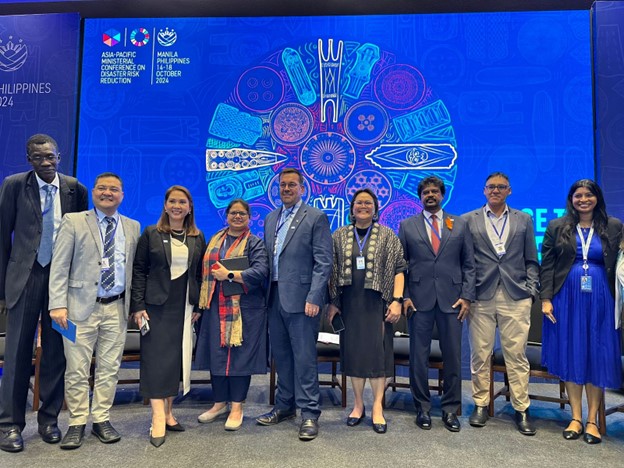- About Us
-
Who we are
-
- Publications
-
- ADPC Academy
-
MediaADPC'S NEWS
Resilient Futures: Bridging Science and Business Solutions Resilient Futures: Bridging Science and Business Solutions
14 Oct 2024
Manila, Philippines
At the Asia Pacific Ministerial Conference on Disaster Risk Reduction (APMCDRR) 2024, the session "Resilient Futures: Bridging Science and Business Solutions" highlighted the critical intersection of science and business in building disaster resilience. Co-organized with the Connecting Business initiative (CBi), the partner event brought together thought leaders and practitioners from various sectors to discuss strategies for enhancing disaster preparedness and response, with a focus on public-private partnerships.
Mr. Vincent Omuga, Deputy Head of Office for the United Nations Office for the Coordination of Humanitarian Affairs (OCHA) in the Asia-Pacific region, opened the session by emphasizing the growing importance of integrating the private sector into disaster risk reduction efforts. He stressed the need for multisector collaboration to address the increasing frequency and severity of disasters worldwide

Dr. Mona Chhabra Anand, Lead for Private Sector Engagement and Resilient Recovery at the Asian Disaster Preparedness Center (ADPC), highlighted the crucial role businesses play in
disaster preparedness, response, and recovery. She highlighted ADPC's initiatives under its i-Prepare Business Facility for Area Business Continuity Planning and initial ideas of deploying IT for business resilience over large trade corridors. Panelists from ARISE Philippines, Vanuatu Business Resilience Council, Asia-Pacific Alliance for Disaster Management (A-PAD), and the Philippine Disaster Resilience Foundation (PDRF) showcased their efforts in integrating business continuity planning with disaster recovery. Global Compact Network Philippines (GCNP) shared insights on how sustainability and corporate responsibility are shaping business contributions to DRR.

Key discussions revolved around innovative solutions, such as leveraging technology to improve early warning systems and integrating climate risk assessments into business operations. The session underscored the importance of stronger partnerships between businesses, governments, and the scientific community, showcasing successful collaborations that have driven scalable solutions. Panelists collectively agreed that the future of disaster resilience depends on harnessing the strengths of all sectors—where science provides knowledge and business drives implementation.
Latest NewsRelated Trainings
-